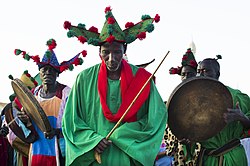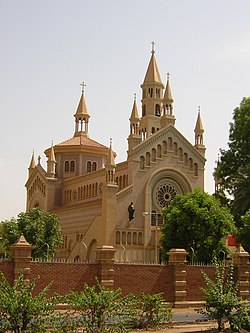
Back الدين في السودان Arabic Religion au Soudan French Religioni in Sudan Italian Религија во Судан Macedonian Agama di Sudan Malay Religião no Sudão Portuguese Религия в Судане Russian Feja në Sudan Albanian
| Part of a series on the |
| Culture of Sudan |
|---|
 |
| Languages |
| Cuisine |
| Sport |


The dominant religion in Sudan is Islam practiced by around 90.7% of the nation's population. Christianity is the largest minority faith in country accounting for around 5.4% of the population.[2] A substantial population of the adherents of traditional faiths is also present.
The ancient Nubian kingdoms in modern day Sudan were bastions of Coptic Christianity, but were increasingly threatened by the Islamic expansion from 7th century onwards, with the southernmost of these kingdoms, Alodia, surviving until 1504.[3][4][5] Nevertheless, the indigenous Nubian Coptic Christians continued to compose a substantial portion of the regions' population up until the nineteenth century, when almost all of them were forcibly converted to Islam under the Mahdist State.[6] Christianity was reintroduced to the country through European missionaries in the early 20th century.[7]
- ^ "Religions in Sudan | PEW-GRF". Pew-Telmpleton: Global Religious Futures Project. Pew Research Center. Archived from the original on 2017-02-02. Retrieved 2020-07-26.
- ^ "Religions in Sudan | PEW-GRF". www.globalreligiousfutures.org. Retrieved 2020-07-26.
- ^ "Sudan ends 30 years of Islamic law by separating religion, state". 6 September 2020.
- ^ "Sudan separates religion from state ending 30 years of Islamic rule". 7 September 2020.
- ^ "Islamic world at decisive point in history: Will it take the path of Emirates or Turkey?". 6 September 2020.
- ^ Minority Rights Group International, World Directory of Minorities and Indigenous Peoples - Sudan : Copts, 2008, available at: http://www.unhcr.org/refworld/docid/49749ca6c.html Archived 17 October 2012 at the Wayback Machine [accessed 21 December 2010]
- ^ "Sudan scraps apostasy law and alcohol ban for non-Muslims". BBC News. 12 July 2020.